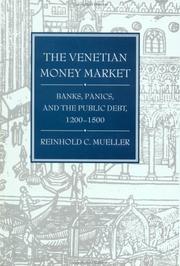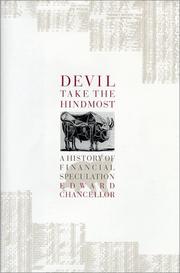| Listing 1 - 10 of 85 | << page >> |
Sort by
|

ISBN: 0801854377 9780801854378 Year: 1997 Publisher: Baltimore Johns Hopkins University Press
Abstract | Keywords | Export | Availability | Bookmark
 Loading...
Loading...Choose an application
- Reference Manager
- EndNote
- RefWorks (Direct export to RefWorks)
Banks and banking --- Money market --- Money --- History. --- History --- 331.162.1 --- Geschiedenis van de financiële markten
Book
ISBN: 9783161576416 9783161576423 3161576411 Year: 2019 Publisher: Tübingen Mohr Siebeck
Abstract | Keywords | Export | Availability | Bookmark
 Loading...
Loading...Choose an application
- Reference Manager
- EndNote
- RefWorks (Direct export to RefWorks)
Economic schools --- Money market. Capital market --- History of Europe --- anno 1800-1999 --- 331.162.1 --- Geschiedenis van de financiële markten
Book
ISBN: 039513935X 0395478057 Year: 1988 Publisher: Boston Houghton Mifflin
Abstract | Keywords | Export | Availability | Bookmark
 Loading...
Loading...Choose an application
- Reference Manager
- EndNote
- RefWorks (Direct export to RefWorks)
Book
ISBN: 9780817922184 9780817922146 9780817922160 9780817922177 Year: 2019 Publisher: Stanford, Calif. Hoover Institution Press
Abstract | Keywords | Export | Availability | Bookmark
 Loading...
Loading...Choose an application
- Reference Manager
- EndNote
- RefWorks (Direct export to RefWorks)
E-books --- Money. Monetary policy --- United States --- 331.162.1 --- 333.81 --- Geschiedenis van de financiële markten --- Algemene evolutie van de kapitaalmarkt --- United States of America

ISBN: 0822315300 Year: 1994 Publisher: Durham, N.C. Duke University Press
Abstract | Keywords | Export | Availability | Bookmark
 Loading...
Loading...Choose an application
- Reference Manager
- EndNote
- RefWorks (Direct export to RefWorks)
Economics --- Sociology of culture --- GB / United Kingdom - Verenigd Koninkrijk - Royaume Uni --- 331.100 --- 331.162.1 --- Economische geschiedenis: algemeenheden. --- Geschiedenis van de financiële markten. --- Economische geschiedenis: algemeenheden --- Geschiedenis van de financiële markten
Book
ISBN: 9782507052454 2507052457 Year: 2014 Publisher: Waterloo Renaissance du livre
Abstract | Keywords | Export | Availability | Bookmark
 Loading...
Loading...Choose an application
- Reference Manager
- EndNote
- RefWorks (Direct export to RefWorks)
Au fil des siècles, les Bourses se sont adaptés à l'évolution économique de nos sociétés. Des tulipes aux produits dérivés obscurs et complexes, les marchés que nous connaissons actuellement ont subi de nombreuses transformations, rythmées par des krachs financiers d'envergure. Un tournant majeur s'opère cependant durant les années 90, au moment où le secteur technologique prend de l'ampleur. Les Bourses perdent progressivement leur visage humain au profit de l'électronique. Les parquets, où s'époumonent agents de change, seuls habilités à pouvoir exécuter les ordres des investisseurs, sont désertés. Ils vont céder leur place aux banques, qui vont elles-mêmes se retrouver face à des acteurs plus importants, appelés traders à haute fréquence. Dans le même temps, les négociations en Bourse s'accélèrent, au point de dépasser largement aujourd'hui la vitesse de la lumière.Le 6 mai 2010, le monde découvre avec stupeur l'importance de ces firmes robotisées sur les marchés, et le rôle qu'elles jouent désormais sur les marchés d'actions et les produits complexes. Pourtant, leur avènement s'accompagne d'une démocratisation des marchés pour tous les investisseurs. Car désormais, il n'a jamais été aussi facile pour le particulier de négocier en Bourse. Et jamais aussi bon marché aussi.Toutefois, la robotisation des marchés financiers pose des défis de taille pour les acteurs qui y interviennent. Tout le monde court après la machine.
Stock exchanges --- Bourse --- History --- Histoire --- 331.162.1 --- 333.610 --- Geschiedenis van de financiële markten. --- Effectenbeurzen: algemeenheden. --- Capital market --- Geschiedenis van de financiële markten --- Effectenbeurzen: algemeenheden --- Geschiedenis van de financiële markten --- Stock exchanges - History --- Capital market - History
Book
ISBN: 9780192589934 9780198849995 0198849990 Year: 2020 Publisher: Oxford Oxford University Press
Abstract | Keywords | Export | Availability | Bookmark
 Loading...
Loading...Choose an application
- Reference Manager
- EndNote
- RefWorks (Direct export to RefWorks)
Although central banking is today often presented as having emerged in the nineteenth or even twentieth century, it has a long and colourful history before 1800, from which important lessons for today's debates can be drawn. While the core of central banking is the issuance of money of the highest possible quality, central banks have also varied considerably in terms of what form of money they issued (deposits or banknotes), what asset mix they held (precious metals, financial claims to the government, loans to private debtors), who owned them (the public, or private shareholders), and who benefitted from their power to provide emergency loans. Central Banking Before 1800: A Rehabilitation reviews 25 central banks that operated before 1800 to provide new insights into the financial system in early modern times. Central Banking Before 1800 rehabilitates pre-1800 central banking, including the role of numerous other institutions, on the European continent. It argues that issuing central bank money is a natural monopoly, and therefore central banks were always based on public charters regulating them and giving them a unique role in a sovereign territorial entity. Many early central banks were not only based on a public charter but were also publicly owned and managed, and had well defined policy objectives. Central Banking Before 1800 reviews these objectives and the financial operations to show that many of today's controversies around central banking date back to the period 1400-1800.
Banks and banking, Central --- Banker's banks --- Banks, Central --- Central banking --- Central banks --- Banks and banking --- History --- E-books --- 331.162.1 --- Geschiedenis van de financiële markten --- Banks and banking, Central - History

ISBN: 0374138583 Year: 1999 Publisher: New York, N.Y. Farrar
Abstract | Keywords | Export | Availability | Bookmark
 Loading...
Loading...Choose an application
- Reference Manager
- EndNote
- RefWorks (Direct export to RefWorks)
Money market. Capital market --- Speculation --- Spéculation --- History --- Histoire --- -AA / International- internationaal --- 331.162.1 --- 333.645 --- Bucket-shops --- Commercial corners --- Corners, Commercial --- Finance --- Gambling --- Commodity exchanges --- Contracts, Aleatory --- Investments --- Stock exchanges --- Geschiedenis van de financiële markten. --- Speculatie op de beurs. --- Spéculation --- AA / International- internationaal --- Geschiedenis van de financiële markten --- Speculatie op de beurs
Book
ISBN: 9789004175655 Year: 2009 Volume: 2 Publisher: Leiden Brill
Abstract | Keywords | Export | Availability | Bookmark
 Loading...
Loading...Choose an application
- Reference Manager
- EndNote
- RefWorks (Direct export to RefWorks)
History of the Netherlands --- anno 1400-1499 --- anno 1500-1599 --- anno 1300-1399 --- Capital market --- Finance --- Marché financier --- Finances --- History --- Histoire --- NL / Netherlands - Nederland - Pays Bas --- 331.162.1 --- Geschiedenis van de financiële markten. --- Marché financier --- Funding --- Funds --- Economics --- Currency question --- Capital markets --- Market, Capital --- Financial institutions --- Loans --- Money market --- Securities --- Crowding out (Economics) --- Efficient market theory --- Geschiedenis van de financiële markten
Book
ISBN: 9789045019864 Year: 2011 Publisher: Amsterdam Atlas
Abstract | Keywords | Export | Availability | Bookmark
 Loading...
Loading...Choose an application
- Reference Manager
- EndNote
- RefWorks (Direct export to RefWorks)
Money market. Capital market --- History of the Netherlands --- anno 1600-1699 --- Amsterdam --- NL / Netherlands - Nederland - Pays Bas --- 331.162.1 --- Geschiedenis van de financiële markten. --- Securities --- History --- Stock exchanges --- Netherlands --- Amsterdam (Netherlands) --- 17th century --- Capital market --- Geschiedenis van de financiële markten
| Listing 1 - 10 of 85 | << page >> |
Sort by
|

 Search
Search Feedback
Feedback About UniCat
About UniCat  Help
Help News
News